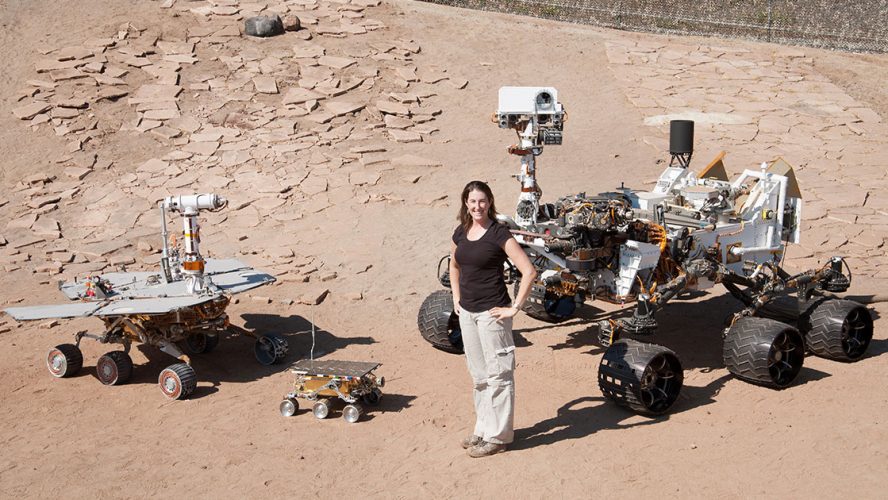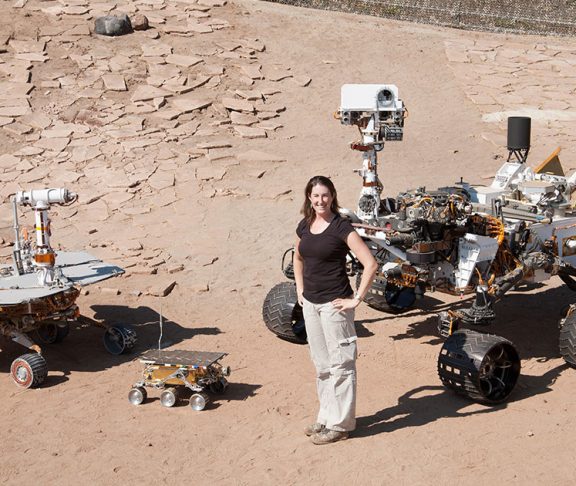NASA robotics engineer, Julie Townsend, talks to Mediaplanet about how she got interested in engineering as a kid, women in STEM, and operating the Mars rover.
First and foremost, what motivated you to pursue a career in engineering & robotics?
When I was in the 8th grade, I was an intelligent kid but fairly unmotivated in school. I qualified for a summer program for gifted and talented kids. Ended up going to this summer program at Purdue and taking an aerospace program almost on a whim, almost at random. I really loved the class and taking that course and that summer program really opened my eyes to possibilities I had never really considered. From that time on I was focused on becoming an aerospace engineer.
What’s aspect of your job gets you the most excited?
The coolest thing I do is go interact with the rover on the surface of Mars. It’s a really cool thing that not many people are able to do. On the other hand, I really like working on those experimental projects. Actually going, sending a sequence of commands to this robot and watching it actually do its thing live and in person.
What is one myth about a career in engineering that you’d like to debunk for readers?
That women who go into technical fields are somehow not feminine. I know lots of women engineers who are at the top of their classes and very skilled as well as intelligent women. But when not at work doing our technical thing, we’re just like any other women. We have our families and we have our interests. We do belly dancing and yoga and all the things that women do in any profession.
Why is it important to encourage more women to enter the engineering and STEM fields and why is it important to have a diverse team in engineering?
I think that’s something which is being recognized more and more in diversity training these days and it is certainly true in robotics. The more diverse your team, the better solution you can reach. It’s because you have more people thinking about it from different perspectives.
What is one piece of advice you would give a young woman about to enter the engineering field?
One of the difficult things when you’re starting college is to find a way to get hands-on experience in your field. Whether that is through internships or companies that you work with on your summer break or undergraduate research opportunities at your college. Go get in the lab and get hands-on with some equipment and understand what people in your field do. So you can get a better understanding of if you enjoy the path you have chosen and if you might want to change it or focus it differently. That hands-on experience will be very valuable when seeking jobs and valuable as a student when understanding the career trajectory that you’re choosing.
Who was your mentor and why is it important to have a mentor in the field?
Growing up outside of Detroit there was a shop teacher at my high school who was very forward thinking about getting robotics into the shop and he had gotten a robotic arm donated for his class. Because of this, we actually had a robotics class in my high school during the 1990s. I got to be a part of that and it’s what really got me interested in robotics.
I think I was really lucky to have that shop teacher in my public high school in the Detroit suburbs. I was one of the only females taking one of his classes and he was always very supportive of my interests and helping me to develop more and more interest in robotics. I think he was really pleased to have a girl who was interested in that sort of stuff and helped me to feel comfortable that I could be talented in this area. Even today, some 20 odd years later, it is still difficult for girls to see themselves in technical careers and study technical majors because there are not always places for them to feel comfortable doing that.

